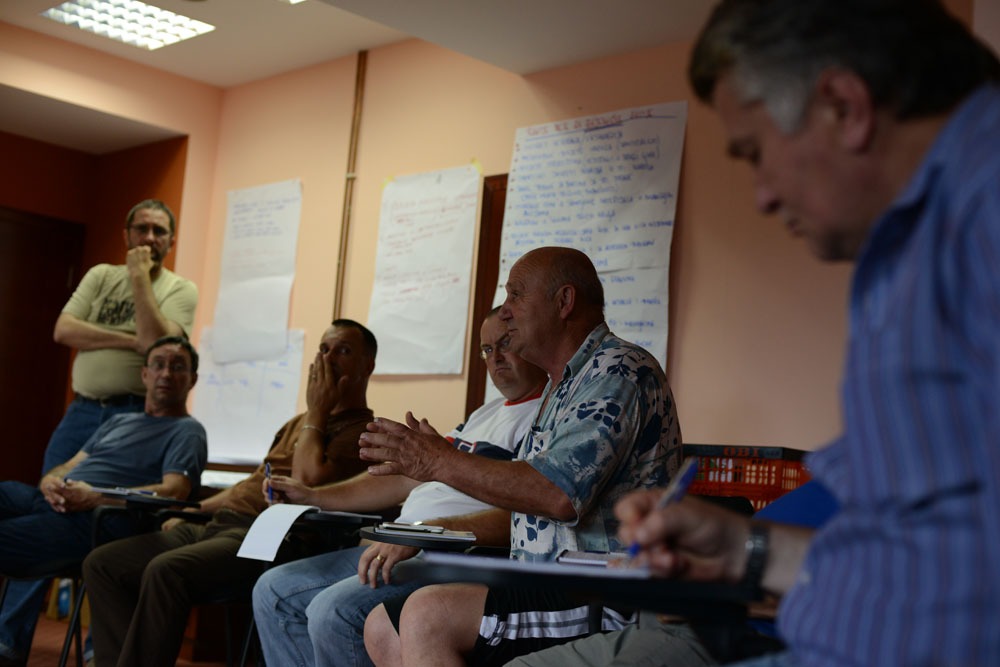This time, the informal group of veterans in peacebuilding (as we, in practice, name the former combatants or war- participants in former Yugoslavia) met in Brčko. An attempt to reach agreement and to define ways for future joint peace actions was made during the three-days workshop organised by CNA. Training team was made of: Nenad Vukosavljević, Nedžad Horozović, Adnan Hasanbegović and Amer Delić.

The war-veteran group consisted of 15 participants from the planned 18.
Unfortunately, three invited persons had to cancel their participation for personal reasons.
The introductory part of the workshop, with the introduction of a new member, showed the extent to which the participants themselves created a safe environment in the group, sensitized to each other, and how they felt mutual trust necessary to continue further work. Among them there were very strong emotions, that characterized a meeting of friends after a long time.
The training team looked back at the past period of several months, which was used for development of plans and readjusting strategy for continuing working with war-veterans. It was particularly emphasized that CNA expects from the participants and the organizations they represent more independent steps in strengthening mutual cooperation, with less or none CNA agitation and assistance in both financial and organizational terms.
The “unsuccessful” attempts to mark the places of atrocities in Šamac and Zavidovići were analysed, which, however, yielded results and empirically determined work in future actions. The reminder of previously proposed joint action was presented, and requested from participants to make a selection of the specific events they see feasible.

The participants formed three independent mixed groups that will organise: visits to the memorial centre in Potočari, Kravice and Vukovar (group I); guest appearance in the “Al-Jazeera Balkan” TV shows at the studio in Sarajevo (group II); and at local TV in Brčko (group III) – by the agreed deadline.
CNA presented the idea of making the ”Identity cards“ of monuments and unmarked sites of suffering in Bosnia and Herzegovina, and expressed expectation to be supported by the participants from BiH in researching the places that are important for the implementation of this idea.
Significant dates from the recent past (symbolically named “red letter”), that are commemorated in their respective communities, were collected from all participants. Everyone had the opportunity to offer where they see the possibility of visit from the “enemy armies”. This way we want to instigate the change of current “mono-ethnic” way of commemoration and celebration of important dates. Individual examples that would be supported by local communities and political structures were separated and analysed, as well as potential problems that the organizers and guests would eventually met.
One of the recognized problems that it is necessary to point out, is the political incompatibility of historical facts in the areas of adjacent municipalities, whereby authorities tend to take into account as valid, only the cases of crimes that are prosecuted (when victims are of their side). It happens that the members of associations involved in peace work are unable to obtain support, both from their organizations, and socio-political establishment, because of the slowness of the judicial authorities in some areas although the facts of committed atrocities are indisputable.
The study travel to Berlin was presented to participants, which will be implemented this year in October. Besides the four representatives of CNA, the trip was also planned for 10 veterans. Unfortunately, the selection will have to be made because most participants are very interested in participating.
The most important feature of this training is the excellent motivation to continue working together in our cross-border group and to intensify work in their own environments. Part of that motivation came from the sense of group coherence and faith in peace work potential, which participants identified within themselves.
Also, the need to involve new members while preserving the group “core” was emphasised as well as the expansion of regional cooperation in areas that have not been involved yet, or where the wider aspect of action have been restrained for various reasons.
Amer Delić
